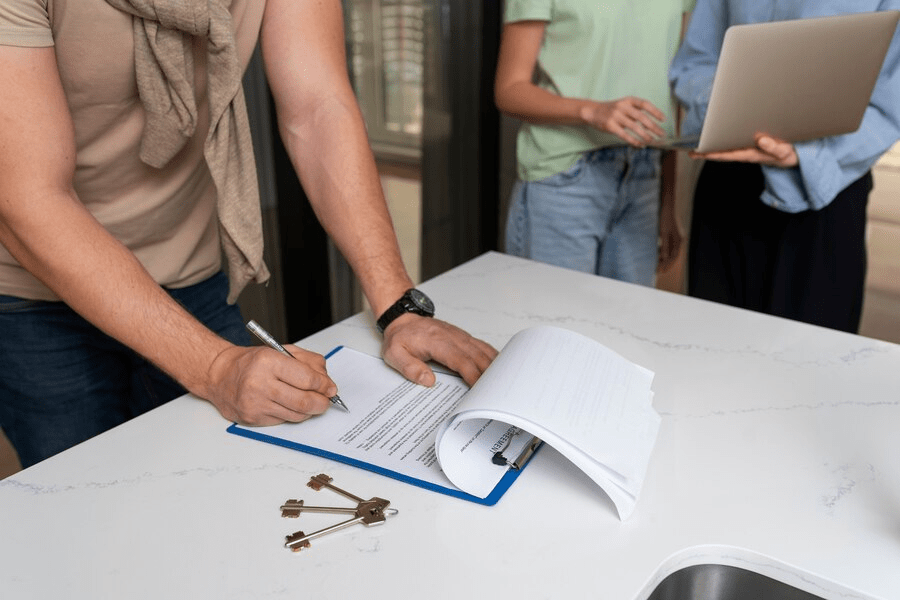


The whole process of buying a home is an exciting yet overwhelming experience when closing the deal. Perhaps the most frequently asked question by homebuyers is, “How long does it take to close on a house?” Certainly, there is no real easy answer to this; however, understanding the generally accepted time frame and a title company’s role can help guide you through some of the final stages in your home-buying process, making everything seem a little bit easier and less daunting.
This blog will outline the typical closing timeline in buying a home, the factors that influence the process, and how a title company can help ensure everything goes smoothly and on time.

This normally takes 30-45 days from the day that the offer is accepted. However, this is all dependent on several factors; whether the financing is a mortgage, it may be a specific property, and can also depend on all parties involved. In some cases, closing can take place as early as 20 days, whereas in some cases, it may even last up to 60 days or even more.
Let’s discuss some of the major phases that define closing and what will happen in each phase.
Once you and the seller agree on the terms, signing a purchase agreement means officially starting the closing process. This is a time-consuming phase that may last between one and two weeks; this all depends upon the time it takes for all negotiations to be settled before the contract is signed. After you have signed the contract, your lender will begin working to finalize your mortgage approval. You can also schedule inspections when necessary.
This is often one of the longest parts of the home-buying process. This includes processing the mortgage application with your lender. It encompasses scrutinizing all financial documents and credit history as well as the property itself. The underwriting process involves how much you can repay the loan and the risk the lender might incur in making that specific loan. For most mortgage buyers, the process takes 10 to 15 business days; however, it may take a longer period if the lender requires additional documentation or when there are appraisal and inspection issues.
You can schedule a home inspection once the contract is signed. The home inspection would typically be scheduled within 7-10 days of agreeing on the deal. The inspector will look for any issues that may include structural problems, mold, plumbing or electrical issues, and much more. Major problems may require repairs from the seller or even negotiations with the buyer.
Similarly, the lender will order an appraisal to determine if it is worth the money one is borrowing. In a case where the appraisal proves to be lower than predicted, the lender might even ask for renegotiation concerning the sale price.
Inspectors and appraisals may add weeks to the duration of the process in cases where there are issues requiring resolution.
Following the inspections and appraisals, a title company conducts a title search on the property to make sure that there are no problems with it, like unpaid liens or claims against the title. It is a crucial process that might take from several days up to two weeks, depending on the complexity of the property.
Once the title search is complete, the title company will provide the title insurance. Title insurance protects against future claims to the property title on both sides of the buyer and the lender.
On the closing day, you will meet all parties present to sign the final set of papers, which entails the deed of trust settlement statement and loan documents, among others. Closing usually takes between 30 minutes and an hour, depending on the kind of complexity involved in the transaction. By this time, the lender will have disbursed the funds, and the title will have been recorded in the deed by the local government, enabling the transfer of ownership of the given property. This is when the house keys are handed over, and the deal is sealed.

A title company plays an important role by ensuring a smooth real estate transaction with a correct transfer of the title of ownership. This is where a title company aids throughout the closing process:
One of the principal duties of a title company is conducting a title search. This checks the public records to ascertain that the seller properly owns the property and that no liens exist, such as unpaid taxes, mortgages, liens, or legal disputes. This is what a title search does: it can dig up a hidden claim on the property that could affect the transfer of ownership.
If the title is flawed, a seller usually has a conversation with the title company regarding resolutions to fix it before a closing is finalized. If you don’t get a title search, you could end up purchasing a property that has problems, such as lawsuits that can endanger your investment.
The title company will issue the title insurance upon completing the title search. Title insurance protects the buyer as well as the lender from anyone making a future claim against the property’s title. For example, after you close, an heir that nobody knew existed may appear and claim the house as theirs, where your title insurance would pay for lawyer’s fees and any financial loss that may be incurred.
There are two basic types: owner’s title insurance, which protects the buyer, and lender’s title insurance, which covers the lender’s investment in the property. The lender’s title insurance is required when the lender demands it, whereas the buyer typically purchases the owner’s title insurance.
The title company assumes the responsibility of closing the transaction, which is executed by making an arrangement for the signing of documents and ascertaining the right procedure for funds disposition. In this regard, they are in charge of coordinating the closing meeting, which brings together both parties to sign the final paperwork. It is there that the buyer also makes payment for any outstanding closing costs.
Apart from ensuring that the paperwork is handled, a title company ensures that all conditions of the sale are met and the transfer of funds is as smooth as possible. It will also file documents with the local government to complete the new ownership.
A title company facilitates recording with local authorities in respect to the deed, or transfer of actual titles, between the seller and the buyer, which transfers legal rights of the property from seller to buyer and serves as an effective bar in preventing subsequent claims of title from parties other than them. This would make buyers vulnerable to getting the wrong and unclear title documentation, thus facing potential future legal conflicts.
The time it takes to close on a home is usually 30 to 45 days. However, this may be more or less depending on financing, complications of property, and if all parties involved are efficiency-oriented. Now, you may not determine how long it takes, but when you’re working with a title company, the most critical aspects of closing are done professionally and as efficiently as possible—the title searches, the insurance on titles and the transfer of ownership.
A title company will protect your financial investment by ensuring that the title is clear. It will also help you close as smoothly as possible. Through their professional services and attention to detail, you can be helped out from potential pitfalls so you get the keys to your new home without undue delays.